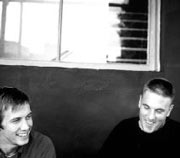ZERO 7, DJ NASIR, AND GUESTS
Showbox, 628-3151, $15 adv. 8 p.m. Fri., May 3
AS ANY TOURIST who ever attended a “live sex show” can attest, certain diversions lose their zing when turned into public performances. Some things are just best left in the bedroom . . . like most down-tempo electronic albums. For every exception like Portishead that graduates gracefully from studio to stage, there are a disheartening number of flops that wind up sounding closer to a three-shows-nightly casino cover band (see also: Groove Armada) when they hit the live circuit.
Sam Hardaker acknowledges that despite the critical laurels heaped on Simple Things (Palm Pictures), the debut full-length from Zero 7, translating the North London duo’s alluring blend of laid-back beats, evocative songwriting, and touches of vintage jazz, funk, and soul hasn’t come easy. So he and partner Henry Binns brought along reinforcements for their first U.S. tour; Zero 7’s live band, including original album vocalists Sophie Barker, Sia Furler, and Mozez, numbers 11. Just 11. “The record company wouldn’t allow us to bring a string section,” Hardaker laments. “Believe me, if they had, we would’ve.”
Zero 7 are learning as they go. Although Simple Things garnered Mercury Prize and Brit Award nominations last year and spawned a top-30 U.K. single (“Destiny”), Hardaker insists he and Binns made the album with “no real expectations” of widespread acceptance. “I’m not trying to be overly modest, but we thought if we could sell 20,000 records in some specialist stores, that’d be it.” Instead, Simple Things has already moved over 10 times that many discs back home, and is steadily making inroads stateside.
The shy guy routine isn’t a put-on, though. While Hardaker and Binns have been in the music business since the late ’80s, their prior experience was strictly behind the scenes. The friends, who met while in their teens, began their careers as assistant recording studio engineers, crossing paths with everyone from the Pet Shop Boys to Robert Plant. During off-hours, they started crafting their own originals, albeit with specific criteria in mind.
“A lot of people who work in studios make records—and some of them are fantastic—but they’re more about sonic detail than overall production,” Hardaker concedes. “We appreciate that, but definitely felt that we wanted to write songs and have vocalists involved . . . without turning it into a glossy pop record, either.”
Expectations for Zero 7’s music were running high before they issued their first two limited-edition EPs, thanks to a 1997 remix of Radiohead’s “Climbing Up the Walls.” OK Computer producer Nigel Godrich, an old school chum, tossed the job to the unproven team as an experiment, but soon the sublime results were being championed by BBC Radio 1 tastemaker Gilles Peterson. Minimal yet soulful overhauls for Lambchop, Lenny Kravitz, and others followed, whetting the public appetite for the multifaceted Simple Things.
In an amusing twist of fate, someone else’s remix of Zero 7—Photek’s stripped-down but pumping reworking of the melancholy “Destiny”—has generated much of the fuss over the duo. “I don’t feel as uncomfortable with it now as I initially did,” Hardaker admits. “When we got it, I could appreciate it, but it wasn’t something I would have played. We’ve gone on and had some other mixes done that we’re maybe a little bit more into . . . but they’re the ones nobody else would ever play.” He’s specifically referring to a forthcoming interpretation of “Distractions” by Madlib (alias Otis Jackson Jr.), the producer behind such underground hip-hop notables as Quasimoto and Yesterday’s Quintet, both of which are represented on Zero 7’s recent contribution to Kinetic’s Anotherlatenight after-hours mix CD series.
Yet, while Hardaker suggests working with a live band will undoubtedly influence the creation of their sophomore full-length, “we’re always going to want an element of the bedroom” in the production, he says. And yes, he’s looking forward to getting off that tour bus and wrapping up promotional responsibilities very soon. “I can’t convey to you how removed all this is from our daily existence,” he concludes. “It’s great to have the response we’re getting here, but the flip of that—having more and more people and machinery involved—is daunting. But once we get back, it’s just me and Henry and our tiny little studio, and it’ll be exactly the same as it was before.”






